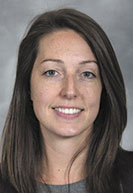Subscriber Benefit
As a subscriber you can listen to articles at work, in the car, or while you work out. Subscribe NowIndiana Attorney General Todd Rokita is under investigation by the Indiana Supreme Court Disciplinary Commission in relation to his televised statements about the doctor who oversaw a medication abortion for a 10-year-old rape victim from Ohio.
Documents first reported by the Indiana Citizen additionally show Rokita’s office hired a Washington, D.C., law firm to help litigate a medical licensing case against Dr. Caitlin Bernard.
The same lawyer is also representing Rokita in his disciplinary case but it is unclear if state funds are paying him.
The proceedings stem from an ongoing legal saga between Rokita and Bernard, an Indianapolis OB-GYN.
Marion Superior Court Judge Heather Welch ruled in December that the Republican attorney general violated the state licensing statute’s confidentiality provision when he disclosed his office was investigating Bernard. He made the public statements on Fox News before he filed a complaint against the doctor with the Indiana Medical Licensing Board.
Rokita’s office did not respond to the Indiana Capital Chronicle’s request for comment about the disciplinary investigation or his outside legal counsel.
Rokita’s outside counsel
Gene Schaerr, managing partner of the Schaerr Jaffe law firm, filed a petition Feb. 2 with the Indiana Supreme Court, requesting to represent Indiana in the case Rokita brought before the medical licensing board against Bernard.
Schaerr also indicated he has filed a similar petition to appear before the Disciplinary Commission in the grievance against Rokita.
The document is the first to publicly confirm that complaints filed by several Indiana attorneys are being investigated by the disciplinary commission.
Although the petition does not identify the specific reason for the investigation, the citation to the commission’s case references the attorney general’s public comments about Bernard.
Rokita’s office has contracted with the outside counsel since 2019, according to the Indiana Department of Administration — initially on other abortion-related litigation.
The Attorney General’s Office amended its contract with Schaerr Jaffe in December, dishing out an additional $100,000 to the law firm for additional services related to Bernard’s case.
Indiana’s rules for lawyers
Last summer, former Indiana University Maurer School of Law Dean Lauren Robel alleged Rokita made “false or baseless” statements about Bernard. She filed a complaint with the Disciplinary Commission in July.
Robel further asserted to the Disciplinary Commission that Rokita did not retract those comments even after they were shown to be false.
“If he can throw the entire weight of his office without consequence to attack Dr. Bernard, he can do so to target any private citizen with whom he disagrees,” Robel wrote. “This is the opposite of the rule of law.”
The Indiana Rules of Professional Conduct state that lawyers holding public office assume legal responsibilities “going beyond those of other citizens.” A lawyer’s abuse of public office “can suggest an inability to fulfill the professional role of lawyers.”
The rules instruct lawyers not to “make a false statement of material fact or law,” and instead “be truthful when dealing with others on a client’s behalf.”
Attorneys are additionally required to avoid “misrepresentations,” which can occur if a lawyer “incorporates or affirms a statement of another person that the lawyer knows is false.”
Misrepresentations can also occur when making “partially true but misleading statements or omissions that are the equivalent of affirmative false statements,” according to the attorney guidelines.
Lawyers who “engage in conduct involving dishonesty, fraud, deceit or misrepresentation” are in violation of the professional conduct rules and subject to discipline.
The Indiana Supreme Court Disciplinary Commission previously told the Indiana Capital Chronicle it could not confirm or deny if a complaint has been filed against Rokita — who is currently in good standing — unless it decides to file formal disciplinary charges against him.
Still, most of the complaints filed with the Disciplinary Commission do not result in any action. During the 2022 fiscal year, the commission received 1,270 complaints, according to the Indiana Supreme Court’s annual report. Of those, 997 were dismissed. Another 273 were investigated; 72 of those were also dismissed after review.
The commission previously investigated Rokita’s predecessor, former Indiana Attorney General Curtis Hill, following allegations that Hill groped four women during a party at an Indianapolis bar.
Although the commission recommended that Hill’s law license be suspended for two years, the Indiana Supreme Court suspended Hill’s law license for just 30 days. Hill continues to maintain no wrongdoing.
Rokita-Bernard saga
Bernard previously sued to stop Rokita’s office from obtaining certain patient records related to her care for the 10-year-old, who sought an abortion in Indiana after her pregnancy progressed beyond the 6-week cutoff in Ohio.

Bernard’s legal team voluntarily dismissed the case after it transitioned to an administrative licensing action before the Indiana Medical Licensing Board, scheduled to be heard later this month.
Rokita filed to reopen the case Jan. 9 to refute the Superior Court judge’s “erroneous finding” that he violated state confidentiality laws. The Schaerr Jaffe firm is assisting in those efforts, documents show.
Indiana’s General Assembly passed a near-total abortion ban in a special legislation session over the summer – with proponents citing the 10-year-old’s case as a reason to include exemptions for rape and incest.
But two separate judges granted injunctions temporarily blocking the ban. The Indiana Supreme Court elected to hear the case in January. It’s not clear when the justices will make their ruling, however.
The Indiana Capital Chronicle is an independent, not-for-profit news organization that covers state government, policy and elections.
Please enable JavaScript to view this content.

